by Dr. Steven Mintz
What would you do if you discovered that a superior was engaged in inappropriate conduct? Beyond matters that deal with sexual harassment and other forms of discrimination that should be reported to the Human Resources Department, employees sometimes uncover fraudulent financial practices and are faced with an ethical dilemma whether to report them to higher-ups in the organization.
What is Ethics?
Ethics addresses issues about right and wrong from a variety of lenses. One is whether the consequences of intended actions benefit the stakeholders affected by those actions while minimizing the harms. This is known as consequentialism.
Another is Rights Theory where universal rights are identified and obligations determined to match those rights through ethical decision making.
Virtue is another perspective where decisions are made based on positive traits of character such as honesty, integrity/courage, justice/fairness, and responsibility.
These are important characteristic behaviors of ethical managers.
Ethical decision making is a process by which decisions can be reached in a systematic way by using these lenses.
Imagine that you suspect your boss of stealing from the organization. How would you handle this matter? You may know it’s wrong and want to report it, but fear the consequences. You may be retaliated against – i.e., demoted; loss of pay; firing.
A person of courage would have the strength of character to report the wrongdoing regardless of the consequences. The likelihood of reporting is generally linked to the culture of the organization.
Ethical decision making requires a strong culture and clear lines of communication. It relies on dedicated managers who are committed to doing the right thing and willing to support the internal systems developed to report wrongdoing without fear of retaliation.
Ethical decisions should consist of the following steps.
- Gather the necessary facts.
- Identify ethical issues.
- Identify stakeholders.
- Analyze the situation from an ethical perspective using the various lenses.
- Determine alternative courses of action.
- Seek supporters in the organization to help make your case.
- Decide on a course of action.
Employees and managers who face ethical dilemmas should be aware of the following.
- What is the organization’s policy on reporting alleged wrongdoing?
- Who should I contact about my concerns?
- What is the likelihood of being retaliated against?
- How far am I willing to go in reporting the matter to top management?
Small Businesses
Small businesses are particularly vulnerable to the wrongful use of organization resources (i.e., occupational fraud) because of the trust that exists between owners and employees.
Owners of small businesses know their employees and may have a personal relationship.
In such cases, it is reasonable to expect that the employees would not steal from the organization or otherwise misuse resources. Yet, it is that very trust that sometimes motivates an ill-doer to commit the unethical act.
The Report to the Nations: 2018 Global Study on Occupational Fraud and Abuse published by the Association of Certified Fraud Examiners points out that small businesses may not have the systems in place to both prevent and recover from fraud.
Financial statement fraud cases were the most costly with a median loss of $104,000 in organizations with 100 or more employees while smaller organizations (less than 100 employees) showed a median loss of 200,000.
One reason for the higher level of fraud in small businesses is the increased level of trust in employees due to a lower ability to implement robust anti-fraud controls. Another reason is the lack of internal controls to prevent and detect fraud.
The following causes of occupational fraud were identified in small organizations.
| Corruption | 32% |
| Billing | 29% |
| Check and payment tampering | 22% |
| Expense reimbursements | 21% |
| Skimming | 20% |
| Cash on hand | 20% |
| Noncash (i.e., inventory theft) | 16% |
| Cash Larceny | 14% |
| Payroll | 13% |
Small businesses should go beyond developing ethical standards to include compliance controls that help manage risks of fraud. Many organizations now have an Ethics and Compliance Officer.
An internal audit capability is also needed to prevent and detect fraud before it becomes an external reporting matter that might, ultimately, involve regulators.
Workplace Conduct
 The Ethics and Compliance Initiative (ECI) studied workplace conduct from the employee’s perspective. Participants were asked for input on the strength of the culture in their workplace, the instances of misconduct they have observed, and any organizational efforts to promote integrity.
The Ethics and Compliance Initiative (ECI) studied workplace conduct from the employee’s perspective. Participants were asked for input on the strength of the culture in their workplace, the instances of misconduct they have observed, and any organizational efforts to promote integrity.
Of particular interest is the finding that employees who work in organizations with weak leadership cultures characterized by poor accountability and modeling of ethical behavior are more likely to encounter interpersonal misconduct than those in organizations with stronger cultures.
The comparative results on weaker versus stronger culture include :
- More likely to observe abusive behavior (69% vs. 15%)
- More likely to observe discrimination (41% vs. 9%)
- More likely to observe sexual harassment (31% vs. 10%).
Ethical risk exists when questions arise about how improper behaviors are handled.
Beyond strong leadership and an ethical company culture, the ECI study points to whether accountability for one’s actions plays a prominent role in the culture as indicated by holding employees and managers accountable if they were caught violating company standards of conduct.
Accountability is an essential component of ethical behavior. Employees and managers who engage in improper behaviors should be held accountable to demonstrate strong leadership and send a clear message that fraud and other violations will be dealt with expeditiously.
The tone at the top set by management and the board of directors should be that these matters are taken seriously and reporting of wrongdoing is encouraged.
Whistleblowing
In March 2018, the ECI issued another study, The State of Ethics & Compliance in the Workplace, that looks at workplace conduct with respect to reporting wrongdoing. The comparative results of the study versus one taken five years ago are:
- Employees reported observing misconduct (47% 51%)
- Employees reported the misconduct (69% vs. 64%)
- Employees experienced pressure to compromise standards (16% vs. 13%)
- Employees experienced retaliation (44% vs. 22%).
It is troubling that while more employees report misconduct, they also experience more pressure to go along and higher levels of retaliation for not doing so. The question is: Why would an employee risk his or her career by reporting wrongdoing in an organization that doesn’t support whistleblowers?
The reason for the higher level of reporting may be the passage of laws that encourage employees to blow the whistle (i.e., Sarbanes-Oxley Act; Dodd-Frank Financial Reform Act).
These laws anticipate that employees will first report the matter internally but if corrective action is not taken, external avenues of reporting exist including regulatory agencies. It is ironic that the laws that seek to protect whistleblowers may have the opposite effect.
The likely explanation is a weakening culture and failure of compliance systems to ensure whistleblowing is taken seriously.
Conclusion
Organizations of all sizes should commit to establishing an ethical culture by implementing the following processes.
- Develop a code of ethics that details responsibilities for ethical behavior.
- Identify key management to whom wrongdoing should be
- Instill an ethical tone at the top that permeates all decision
- Create an anonymous reporting process (i.e., hotline) for those with concerns about questionable
- Design a compliance system to ensure internal reporting processes are operating as intended.
Ethical behavior is a long-term commitment to do the right thing regardless of the consequences. Managers should take these matters seriously, not retaliate against whistleblowers, and they should control for the ethical risks that exist in all organizations, especially small businesses.
Dr. Steven Mintz (www.stevenmintzethics.com), author of Beyond Happiness and Meaning: Transforming Your Life Through Ethical Behavior, has frequently commented on ethical issues in society and business ethics. His Workplace Ethics Advice blog has been recognized as one of the top 30 in corporate social responsibility. He also has served as an expert witness on ethics matters. Dr. Mintz spent almost 40 years of his life in academia. He has held positions as a chair in Accounting at San Francisco State University and Texas State University. He was the Dean of the College of Business and Public Administration at Cal State University, San Bernardino. He recently retired as a Professor Emeritus from Cal Poly State University in San Luis Obispo.
